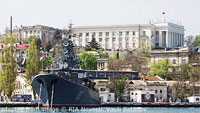Russia steps up trade war with Ukraine

(Business New Europe – bne.eu – Tim Gosling in Prague – August 15, 2013) Russia imposed restrictions on all Ukrainian imports, the Federation of Employers of Ukraine claimed on August 14. The escalation of Moscow’s trade war against its neighbour appears a bid to step up pressure on Kyiv to drop any ambition it has to move towards the EU.
The Russian Customs Service has included all Ukrainian suppliers in a “risky” list of imports that are subject to stricter customs control, the Interfax news agency reported on August 14, citing the Federation of Employers of Ukraine. Beginning August 14, all Ukrainian suppliers to Russia are subject to customs control that will result in a delay in the flow of goods into the country by weeks or even months, the federation stated.
The claim comes two days after local media reported that a list of 46 Ukrainian companies had been categorized as “risky”. That followed a July 29 ban placed by Russian consumer rights watchdog Rospotrebnadzor on Ukrainian confectionary producer Roshen. One of Ukraine’s largest exporters, Donetsk-based steel producer Metinvest confirmed to Interfax that it has experienced tougher controls on its products at Russian customs since August 13.
Pressure points
The move from Russia comes as analysts continue to wonder how Ukraine struggling with dwindling reserves and increasing pressure on the local currency, the hryvnia can stave off another crisis without caving in to the demands of either Moscow or Brussels in return for help. “The conflict comes at the worst possible time since pressure on the hryvnia usually escalates in early autumn,” point out analysts at Concorde Capital.
Tim Ash of Standard Bank says Russia’s actions could be potentially very disruptive to the Ukrainian economy, as it relies on the Commonwealth of Independent States for around one third of trade, “is already in recession, and to many people already on the edge.”
The background to the dispute is a battle for influence. Ukrainian President Viktor Yanukovych has long been playing Russia and the West off against one another, with the general consensus being that the powerful oligarchs that back him don’t want to see either strict EU oversight and transparency, or rapacious Russian competition for assets. However, that strategy appears to have run its course.
Brussels has recently tried to up the ante. The EU has now said that Ukraine must sign off on a long-delayed free trade agreement in November, or the process will go back to square one. That would see any deal put back by years. However, the clear condition to reach an agreement is for Yanukovych to release jailed opposition leader Yulia Tymoshenko a move the president is resisting.
Alongside Kyiv’s increasing economic vulnerability, that step-up in pressure from Brussels is also likely to have prompted Russia to try to turn the screw. The Kremlin demands Ukraine join the Customs Union that it set up with Belarus and Kazakhstan in 2010, and has been waging a low-intensity war on Kyiv via its dominance of the country’s gas supply. Ash notes Ukraine has slashed its Russian gas imports by around one-third so far this year, but Moscow still holds the ace up its sleeve of the “take-or-pay” clause in the 2009 gas agreement that was negotiated when Tymoshenko was prime minister (and led to her jailing). The clause says Ukraine is bound to pay for gas even if it doesn’t need it, which could result in it being lumbered with a multi-billion-dollar gas bill when it can least afford to pay. “Anywhere up to $10bn in my estimates,” says Ash.
“The question,” Ash suggests, “is whether Moscow sees this as a slow burn agenda, or an opportunity in the much nearer term, given the pressure from the EU in terms of the [deep and comprehensive free trade agreement], plus also Ukraine’s pretty dismal macro outlook at present.”
